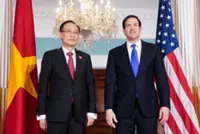HANOI: Singapore and Vietnam announced the virtual ground-breaking of the Vietnam-Singapore Industrial Park (VSIP) in Thai Binh province on Wednesday (March 26).
The 333ha VSIP Thai Binh is one of the 20 VSIPs which are a key plank of the two countries’ relationship.
VSIP Thai Binh is nestled within northern Vietnam’s growing industrial ecosystem and is set to become a key satellite industrial park, supporting a broad network of manufacturers and suppliers across high-value sectors such as electronic components, precision engineering, and renewable energy. Industrial land at VSIP Thai Binh will be available for handover to customers in 2026.
“The VSIPs have been the cornerstone of our bilateral cooperation for almost three decades,” said Prime Minister Lawrence Wong at the virtual ground-breaking ceremony alongside Vietnamese PM Pham Minh Chinh.
“From the beginning, they have set the benchmark for industrial park development in Vietnam – providing international-standard infrastructure to investors, enabling them to establish operations seamlessly,” he added.
Both PMs had a meeting at the Office of Government before the ceremony, where they discussed ways to further strengthen the relationship.
“We both want a Comprehensive Strategic Partnership that delivers concrete results for our peoples,” PM Wong said in a social media post.
“So we are putting together a Plan of Action with specific deliverables that the officials on both sides will be working on.”
Both PMs also witnessed the exchange of five agreements, including a letter of intent on the implementation of the Comprehensive Strategic Partnership, and another to enhance cooperation on cross-border electricity trade for the Asean power grid.
In a speech, PM Wong outlined the broad strokes of the growth of the industrial parks, which are set to be smarter, greener and will have good connectivity between them for greater synergy.
PM Wong added that moving forward, the VSIPs will incorporate smart technology to better manage energy, water, waste, and traffic, so as to lead to better efficiencies, cost savings, and be better for the environment.
The VSIPs will be powered with more renewable energy, at a time when companies seek to decarbonise their supply chains. He cited a Lego factory in VSIP Binh Duong III, whose energy requirements will be met by renewable power – solar panels on its roof, as well as a nearby solar project.
Another area of focus for the VSIPs is to ensure good connectivity between them.
For example, Thai Binh province will be linked by a highway to Lach Huyen Port. Once the highway is completed, VSIP Thai Binh will be well-positioned to serve as a satellite industrial park, supporting existing large manufacturers in other surrounding VSIPs, while attracting investments in high-tech and advanced manufacturing industries.
PM Wong also said Singapore welcomes the import of low-carbon energy into the Republic, which will be made possible through renewable energy projects and the laying of subsea cables.
Singapore and Vietnam are making progress on a joint venture between PetroVietnam Technical Services Cooperation and Sembcorp Utilities to develop an offshore wind farm in southern Vietnam.
There are also discussions on an implementation agreement on carbon credits collaboration between the two countries.
PM Wong said: “Through these projects, we can also pave the way for wider initiatives like the Asean Power Grid, which will improve the collective energy resilience of our region.”
These developments followed after both countries pledged earlier in March to deepen cooperation in areas such as the digital economy, cross-border electricity trade and sustainable infrastructure cooperation, among others.
Chinh said: “This VSIP is a great success which shall be elevated... thereby bringing benefit to both our people. This is a model that will bring tangible and supplementary benefits. We can benefit from each strength that each country possesses.”
In a statement on March 26, Sembcorp Development and its joint venture partner Becamex said they have expanded their VSIP partnership with the development of more prospective parks in Vietnam in southern Binh Duong province, and northern Haiphong City, Hai Duong and Hung Yen provinces. This is in addition to VSIP Thai Binh.
Memorandums of understanding have been signed with local governments for the various VSIP projects.
PM Wong said he was “confident that our VSIPs will evolve with the times, and continue to be centres of innovation, champions of sustainability, and strong pillars of the Singapore-Vietnam CSP”.
He added: “I wish VSIP Thai Binh every success and look forward to the continued fruitful partnership between Sembcorp and Becamex, and the flourishing of Singapore-Vietnam ties for many more years to come.”
Bilateral agreements between Singapore and Vietnam
A total of five letters of intent (LOI) and MOUs furthering cooperation between the two countries were also announced on March 26:
>An LOI for the implementation of the Comprehensive Strategic Partnership between the foreign ministries of Vietnam and Singapore.
>An LOI to enhance cooperation involving both countries’ trade and industry ministries for cross-border electricity trade for the Asean power grid. This builds on an MoU on energy cooperation between Singapore and Vietnam signed in October 2022, and the joint report on offshore wind power trade cooperation between both sides endorsed on March 12. They will explore increasing the targeted capacity of low-carbon electricity imports from Vietnam to Singapore to around 2 gigawatt (GW) by 2035. This builds on conditional approval that Sembcorp Utilities received in October 2023 to import 1.2 GW of low-carbon electricity from Vietnam, via new subsea cables of around 1,000km.
>An MoU on the cooperation in digital development and innovation between the Ministry of Digital Development and Information and Vietnam’s Ministry of Science and Technology. It will enhance exchanges on interoperable digital systems, frameworks and platforms to support seamless digital trade and logistics solutions, and strengthen cooperation in artificial intelligence, referencing international best practices such as Singapore’s Model AI Governance Framework.
>An MoU for cross-border QR code cooperation, to be overseen by Nets Singapore and the National Payment Corporation of Vietnam.
>An MoU between the Singapore International Foundation and Vietnam-Singapore Friendship Association to promote the exchange of information and insights to deepen mutual understanding and cooperation between the two countries. - The Straits Times/ANN





